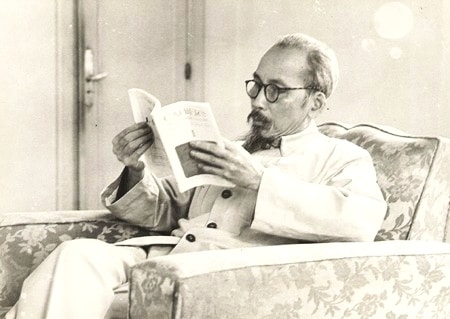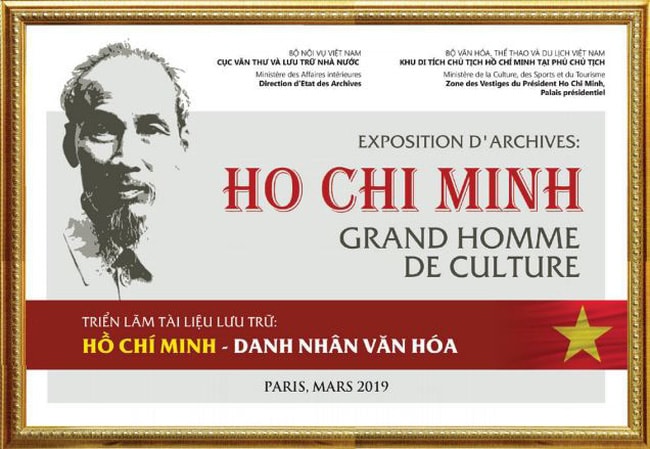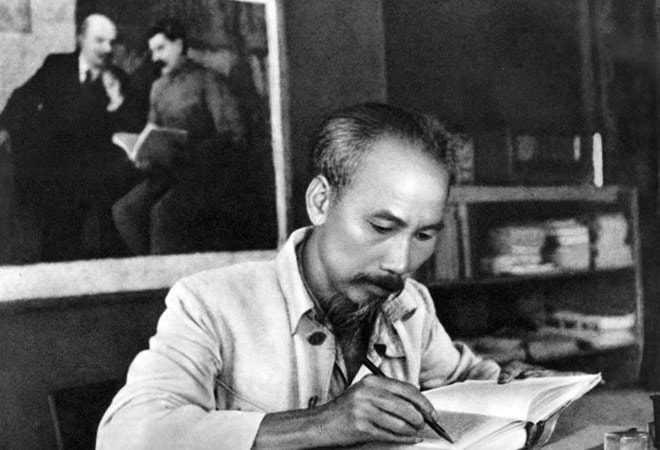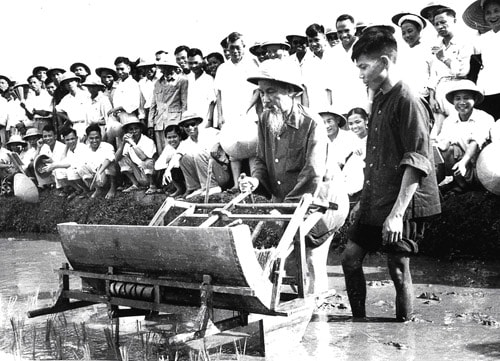An excellent and rich research work on President Ho Chi Minh
(Baonghean.vn) - There have been many books written about President Ho Chi Minh, but the work "Ho Chi Minh, national liberation hero, cultural celebrity" with over a thousand large pages is truly a unique and rich research work about President Ho Chi Minh.
This is a book ordered by the State (so it is now available in libraries nationwide). The book can be called a complete set - a reprint of 3 previously published works:"Ho Chi Minh - cultural celebrity",“Thinking before Ba Dinh”and"Confucianism in Uncle Ho's literature".
 |
| In 1987, the United Nations Educational, Scientific and Cultural Organization, UNESCO, at its 24th General Assembly (in Paris from October 20 to November 20), issued a Resolution awarding President Ho Chi Minh the double title: "Hero of national liberation, great man of culture". |
The work "Ho Chi Minh - Cultural Celebrity" has been reprinted 3 times and has a very special position, first of all because of its "origin". It was Comrade Vu Ky, President Ho's personal secretary, who deliberately chose May 10, 1989 - the 10th anniversary of Uncle Ho writing his Will, to send a car to invite Dao Phan's family to visit Uncle Ho's residence because he trusted Dao Phan to write the work "Ho Chi Minh - Cultural Celebrity" to publish it in time for UNESCO to organize a conference on "Ho Chi Minh - Cultural Celebrity" in Hanoi. (According to the memoirs of Phan Boi Hoan, a former student of Dong Khanh Hue, Dao Phan's life partner).
There was this special “choice” because researcher Dao Phan (real name Dao Duy Denh) is the younger brother of scholar Dao Duy Anh, who was imprisoned twice for imperialism, and was Secretary of the Hue and Hanoi Party Committees before the revolution succeeded. After the August Revolution succeeded, returning from Con Dao, he was assigned to establish and become the Captain of the Central Viet Minh Volunteer Propaganda Team (where core cadres for the provinces of Thanh - Nghe - Tinh, Binh - Tri - Thien were trained for the resistance war against the French), Vice Chairman of the Central Cultural Salvation Group, then went to Viet Bac to become Director of the Guerrilla Publishing House (the predecessor of the current People's Army Publishing House)... He focused on researching Ho Chi Minh since 1970...
 |
| The work "Ho Chi Minh - cultural celebrity" has been reprinted many times. |
Regarding the work "Ho Chi Minh - cultural celebrity", comrade Vu Ky respectfully wrote the "Introduction" as follows:
"...The book "Ho Chi Minh - Cultural Celebrity" was written with the author's painstaking research over the past two decades... As someone who has served Uncle Ho for many years, I am even more delighted to see that the book has presented the vivid and genuine features of him...".
Mr. Nguyen Dy Nien, in a letter to the author of the work "Ho Chi Minh - Cultural Celebrity" first published in 1991, wrote:
"...For a long time in Vietnam, when talking about Ho Chi Minh, we focused too much on the part of the National Liberation Hero and too little on the part of the Cultural Celebrity, or if we did talk about the Cultural Celebrity, it was dry, monotonous, forced and only confined to "Prison Diary" and a few of his writings... As one of the authors of the UNESCO Resolution, I was troubled by that. But Sir, when I skimmed through the 5 chapters of the book, I was shocked and happy because my worries and wishes had been fulfilled...".
 |
| President Ho Chi Minh - Outstanding cultural celebrity. |
The above two comments have partly shown the value of the work. The book consists of 5 chapters:Reminiscences of a Forecast; New Culture; Philosophers and Artists; Human-Educator Strategy; Tradition and Modernity.
Through 5 chapters of the book, with hundreds of specific and vivid examples - including the opinions of many world-famous intellectuals and artists commenting and praising the special qualities in many aspects of Ho Chi Minh, from when he was a young man named Nguyen Ai Quoc searching for a way to save the country to when he became the supreme leader of the nation - the author has convincingly proven that Ho Chi Minh is truly a cultural celebrity of human stature.
That was achieved, first of all thanks to the author's painstaking collection of documents, but more importantly, thanks to the author's fresh and correct perspective, worthy of a great man, overcoming narrow, formulaic thinking when setting an example for a revolutionary. Just reading the first few pages, when the author quotes the article of the Soviet poet Osip Mandelstam after meeting Him in 1923, it is clear enough: "…The whole appearance of Nguyen Ai Quoc exuded politeness and tact. From Nguyen Ai Quoc radiated a culture, not like European culture, but perhaps a culture of the future…”And nearly 10 years later, before the event of the lawyer and the wife of the British Governor General of Hong Kong joining forces to save “Mr. Nguyen”, the author wrote: “…In such cases, no one sees people through class appearances. The trust of an international revolutionary in a royal lawyer, and vice versa, the trust of a royal lawyer in an international revolutionary, do they all stem from “humanity” or “humanity”?...”
Another notable point of the work is that the author analyzed the cultural values and fine traditions of the nation from Nguyen Trai to Phan Boi Chau..., as well as the cultural values of humanity that were expressed in the cultural celebrity Ho Chi Minh; in other words, it was because he knew how to absorb and promote the fine traditions of the nation and knew how to absorb and combine the cultural quintessence of humanity, and did not exclusively worship any "Saint", that he became the "cultural celebrity Ho Chi Minh".
 |
| Uncle Ho at the conference to popularize improved transplanting machines in Tu Liem (Hanoi), July 1960. Photo: Document |
The author also highlighted the unique feature of Ho Chi Minh's "culture" of saying what he did; through his daily activities and behavior, he set a concrete and vivid example. Just to give one example: On the occasion of National Day September 2, 1955, a war invalid from the South was invited to a reception at the Presidential Palace. His real name was Nguyen Tran, he had lost both arms while in charge of a very rudimentary military factory in the South during the French resistance, so he also had the alias Vuong Nhi Chi. While waiting, he asked for directions to the restroom. With his two arms amputated, he was wondering what to do when he suddenly heard a gentle voice behind him: "How do you unbutton it?...”He was still confused and didn’t know how to answer when an old man came over to unbutton his shirt for him, then stood aside, waited for him to finish urinating, then quietly came over to help him button it up. That old man was the President. It turned out that he had coincidentally met him when he asked for directions to the restroom. After leading him back to the reception room, President Ho immediately sternly reprimanded the officials who had been “pointing” and gossiping when he entered the restroom:“The man lost both arms, but no one came to help…”.
Coil"Confucianism in Uncle Ho's literature"was completed in 1985, but it was not until 1996 that it was first introduced to readers. This delay is understandable, because before the "Doi Moi" period, just the title of the book was difficult to appear. Associate Professor, Lieutenant General Van Cuong, one of the first readers of the work "Confucianism in Uncle Ho's Literature" wrote in the "Introduction" of the book as follows:
"...It is not by chance that in the literary heritage of President Ho from 1921, when he introduced the Confucianism doctrine in the Communist Review of the Third International, until 1969, when he wrote his last Testament, when reading, we often recognize the mark of Confucianism... The ethical and political concepts of Confucianism, in their pure essence, still have enough potential strength to join the historical process of Eastern countries... Due to historical constraints, there were times when we viewed Confucianism as a terrible remnant of the feudal regime and confused Confucianism with feudal ideology dressed in Confucianism...".
Regarding this issue, since 1994, Dao Phan has also published the work "Do not confuse Confucianism with feudal Confucianism". With this "theoretical" approach, and "on the basis of profound knowledge" (the words used by General Van Cuong), the work "Confucianism in Uncle Ho's literature" has been highly convincing.
"Only thing is, in this book... here and there, throughout the three hundred pages, there seems to be a sigh, expressing concern: Will our children and grandchildren still have the ability to grasp the concepts:thrifty, honestWill our future generations of cadres be able to voluntarily live and work as "virtuous and close-to-the-people" public servants, as Uncle Ho wished?Associate Professor Van Cuong wrote like that at the end of his "Introduction" to Dao Phan's work.
The pages of the book vividly depict the rich beauty of a great man while making people wonder and worry. Perhaps that is the author's success, a reason why we come to Dao Phan's 3 works about Ho Chi Minh - this time printed in the luxurious "Ho Chi Minh - Hero of National Liberation, Cultural Celebrity" Collection, providing valuable documents with thorough and sharp analysis, very useful for all those who want to study about Ho Chi Minh, worthy of being a work of "weight" on the occasion of the 130th anniversary of his birth...


